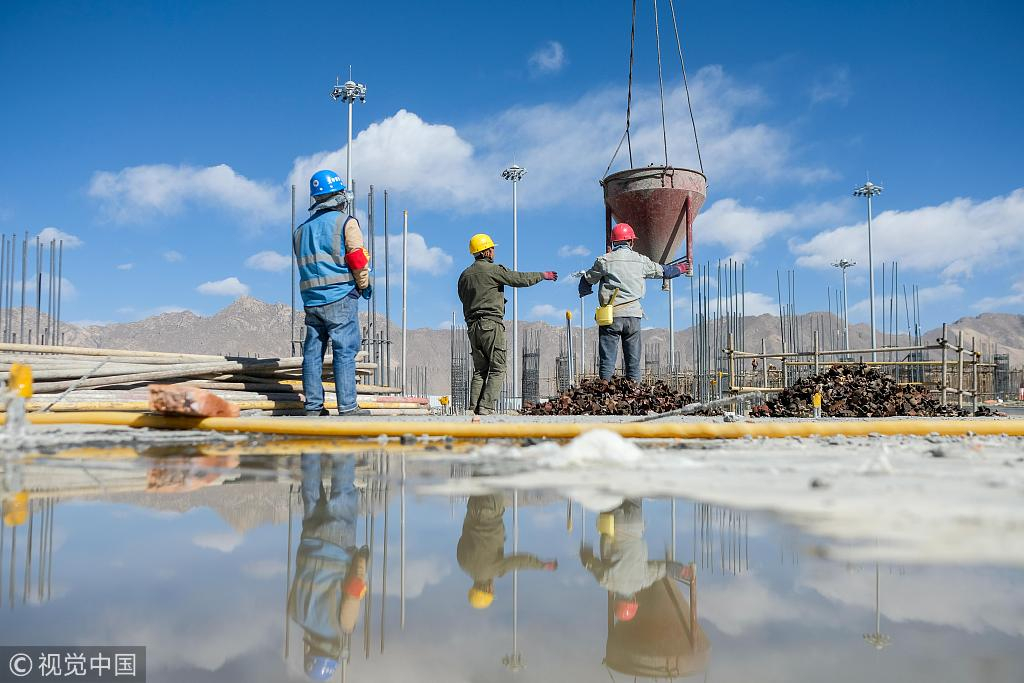
Opinion
11:57, 24-Mar-2019
U.S. law on Tibet a blatant interference in China's domestic affairs
Updated
14:10, 24-Mar-2019
Du Yongbin

Editor's Note: Du Yongbin is a research fellow at the Institute for Contemporary Tibetan Studies, China Tibetology Research Center. The article reflects the author's opinion, and not necessarily the views of CGTN.
This year marks the 60th anniversary of the democratic reforms in Tibet Autonomous Region. Over the past six decades, great changes have taken place in Tibet and Tibetan areas in Qinghai, Sichuan, Yunnan, and Gansu provinces.
At present, people of all ethnic groups in Tibetan areas are coming together to fight against poverty to ensure that Tibetan areas and other parts of China alike will become a moderately prosperous society by 2020.
However, the U.S. has been impairing the U.S.-China ties by initiating trade frictions with China, passing the Taiwan Travel Act and the Fiscal 2019 National Defense Authorization Act.
It is crystal clear that the U.S. seeks to comprehensively contain China's rise by creating a chain of thorny issues for the Asian giant, such as those related to trade, the South China Sea, and Taiwan.
In the first two decades of the 21st century, the U.S. tactic of interfering in China's domestic affairs with the Tibet question has become increasingly routinized and even “legalized.”

Lhasa Gonggar Airport is being reconstructed in Lhasa, Lhasa, capital city of Southwest China's Tibet Autonomous Region, March 22, 2019. /VCG Photo
Lhasa Gonggar Airport is being reconstructed in Lhasa, Lhasa, capital city of Southwest China's Tibet Autonomous Region, March 22, 2019. /VCG Photo
The Trump administration, with its passing of the Reciprocal Access to Tibet Act, added just one more record to such interfering attempts.
The Tibet bill was jointly introduced by Congressmen Jim McGovern (Democrat) and Randy Hultgren (Republican) in June 2014 and signed into law as the Reciprocal Access to Tibet Act of 2018 by President Donald Trump on December 19, 2018.
The legal status of the Act gave the McGovern group one more favorable card to interfere in China's domestic affairs.
The Act seeks to promote access to Tibet for U.S. diplomats, journalists, and tourists by denying entry into the United States for Chinese officials deemed responsible for "restricting" access to Tibet.
According to the Act, U.S. citizens should be granted "unlimited access" to Tibet, a part of the Chinese territory; otherwise, the U.S. will "retaliate" against China.
The Act defames the opening-up policy of China's Tibet and applies discriminatory visa policies to Chinese officials in charge of Tibet-related affairs.
The Act interferes grossly in China's domestic affairs with reckless disregard for facts and goes against the basic norms of international relations. It sent a seriously wrong message to "Tibetan independence" forces.
The attempt by the U.S. to apply its domestic law on Chinese soil is judicially flawed in the first place.
Over the past four decades, China grants eligible foreign nationals legal access to Tibet and Tibetan areas in other provinces.

Tibetan pilgrims prostrate themselves in Lhasa, capital city of Southwest China's Tibet Autonomous Region. /VCG Photo
Tibetan pilgrims prostrate themselves in Lhasa, capital city of Southwest China's Tibet Autonomous Region. /VCG Photo
Since 2015, U.S. visitors to Tibet and Tibetan areas totaled nearly 40,000, including the high-level delegation of the U.S. Congress at the invitation of the Chinese government in November 2015.
Meanwhile, taking into consideration Tibet's special geographic and climatic conditions, cultural characteristics, transportation, and hospitality service capacities, the Chinese government has taken certain administrative measures in accordance with laws and regulations for foreigners to enter Tibet. This is totally necessary and justified.
In the past six decades since the democratic reforms in Tibet Autonomous Region the Chinese government has shown the utmost respect for human rights. It has realized the all-round development of human rights and made great progress in the cause of human rights in Tibet.
As declared by the Chinese government, China's door to the outside world will open even wider, so will Tibet and Tibetan areas in other provinces.
China welcomes more foreigners to visit, travel to and do business in China's Tibetan areas.
Tibet-related affairs belong to China's domestic affairs that no foreign country can interfere in. The U.S. should be aware that Tibet-related affairs concern China's national interests.
Therefore, the U.S. should stick to its commitments by refraining from interfering in China's domestic affairs and eliminating any negative influence brought by the Act so as to avoid impairing China-U.S. ties and cooperation in major areas.
(If you want to contribute and have specific expertise, please contact us at opinions@cgtn.com.)

SITEMAP
Copyright © 2018 CGTN. Beijing ICP prepared NO.16065310-3
Copyright © 2018 CGTN. Beijing ICP prepared NO.16065310-3